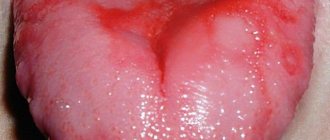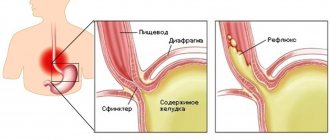Content:
- The main causes of the smell of acetone from the mouth 1.1. Hunger 1.2. Alcohol poisoning 1.3. Physical fatigue 1.4. Acetonemic syndrome 1.5. Gestation period 1.6. Diabetes mellitus 1.7. Ketoacidosis 1.8. Thyrotoxicosis 1.9. Liver diseases 1.10. Kidney diseases 1.11. Schizophrenia
- Other causes of the problem
- Diagnostic measures
If your breath smells like acetone (dimethyl ketone), you should think about your health. This is a dangerous symptom that occurs in a variety of diseases. Normally, the acetone smell should not come from a person. Therefore, it is important to identify why it appeared and what can be done to get rid of it.
What makes up the taste and smell in the mouth?
Normally, our breath should be clean and fresh, and the taste in our mouth outside of food should be neutral. This suggests that there are no pathologies or diseases in our body, all metabolic processes proceed without deviations.
What makes up the taste and smell in the mouth?
- Exchange processes. Normally, metabolic products are completely eliminated from the body and do not lead to the development of foreign tastes or odors outside of food intake.
- Oral cavity condition. More than 200 species of bacteria live in the oral cavity. Some of them lead to pathological processes and the appearance of unpleasant sensations in the mouth.
- Poisoning. When toxic substances and heavy metals enter the body, corresponding sensations appear in the mouth. This is how mercury poisoning gives a metallic taste.
- Diseases. Excessive release of bile and problems with excretion of metabolic products lead to an unpleasant taste in the mouth.
- Oncological diseases. Benign and malignant brain tumors lead to disruption of the normal perception of tastes and smells.
- Neurodegenerative diseases. Degenerative processes occurring in the brain operate in a similar way.
If these symptoms occur one-time, then this is not a reason to panic and immediately consult a doctor. However, if this symptom persists for several days, you should definitely consult a physician.
Note!
If you have lost your sense of taste or your usual foods have changed their taste, this is a reason to consult a doctor as soon as possible. Such changes may be signs of serious illnesses that require immediate treatment.
The main causes of acetone odor from the mouth
The unpleasant odor of acetone from the mouth may be a consequence of:
- poor nutrition, prolonged fasting;
- acute alcohol poisoning;
- physical fatigue;
- acetonemic syndrome;
- pregnancy;
- diabetes mellitus;
- ketoacidosis;
- thyrotoxicosis;
- severe disturbances in the functioning of the liver and kidneys;
- schizophrenia.
Let's look at each reason in more detail.
Hunger
If you follow a low-carbohydrate diet for a long time, the body will begin to use up reserves of proteins and fats as sources of energy. With the active breakdown of lipids, ketone bodies are formed. They are responsible for the taste of acetone in the mouth.
The symptom is especially pronounced in the morning, immediately after waking up . If a person does not stop fasting, his urine will also begin to smell.
Alcohol poisoning
As a result of alcohol intoxication, many biochemical reactions begin to proceed incorrectly. Catabolic processes come to the fore. Ketone components are actively synthesized. Then in the morning after a feast, the addict is faced with an unpleasant acetone aroma.
Physical fatigue
An increase in the level of ketone bodies is often observed in professional athletes and people involved in strength sports. Their body actively breaks down fats to get an additional portion of energy. This is the reason for the increase in dimethyl ketone concentration.
If an unpleasant symptom persists for several days in a row, you cannot ignore it. It is recommended to visit a doctor and undergo laboratory tests.
Acetonemic syndrome
Most often, this condition is found in preschool children. The child is very nauseous and vomits periodically. He becomes lethargic, passive, pale, refuses to eat, and sleeps poorly. The patient smells strongly of acetone.
Often acetone syndrome is caused by severe viral and infectious diseases , fever, and dehydration. If it develops, you should urgently consult a pediatrician.
Pregnancy period
While carrying a child, the load placed on a woman’s body increases many times over. Important hormonal changes occur. Some expectant mothers experience changes in their sense of taste in the first trimester. They begin to smell dimethyl ketone when they eat or drink something.
There is no need to worry about such changes. As a rule, they go away on their own along with toxicosis. But you still need to notify your obstetrician-gynecologist about strange sensations.
Diabetes
The smell can occur during a long and complex course of the disease. This symptom is not characteristic of the initial period of diabetes. At the same time, the patient begins to suffer due to a constant feeling of thirst, drying out of the mucous membranes of the oral cavity, and decreased appetite.
Ketoacidosis
A dangerous complication of diabetes. It is characterized by a rapid increase in the concentration of ketone bodies against the background of cessation of insulin production. This can happen with a fever, and also if a person forgot to take the next insulin injection, the day before he worked a lot and hard.
The situation with this diagnosis worsens gradually. First, the patient notices that he constantly feels the taste of dimethyl ketone. His thirst increases. Then weakness appears and breathing quickens. It is important not to wait for the complication to progress and to seek medical help as soon as possible.
Thyrotoxicosis
With thyrotoxicosis, the content of thyroxine in the blood increases. As a result, the breakdown of protein structures in the human body is activated. A strange chemical taste appears in the mouth, which disappears temporarily after brushing your teeth. If the patient drinks little and eats poorly, the manifestations of the disease become more obvious.
Liver diseases
The liver is the natural filter of the human body. It is responsible for neutralizing toxins and harmful substances, removing incompletely oxidized metabolic products.
If severe liver disease has developed, a specific acetone taste very often occurs. He is accompanied by:
- weakness;
- nausea;
- pain in the right hypochondrium;
- constipation or, conversely, diarrhea.
Among the main liver disorders in which the aroma of acetone appears are:
- Viral diseases. Among them: hepatitis B and C, cytomegalovirus infection.
- Failure in the functioning of the liver parenchyma due to severe intoxication of the body.
- Liver failure, Reye's syndrome, drug overdose.
Kidney diseases
With kidney problems, the body cannot normally eliminate toxic ketone substances. Then the taste of dimethyl ketone remains permanently. There is a failure of nitrogen metabolism. The patient's appetite worsens and nausea appears.
People who have been diagnosed with acute renal failure often complain of an acetone taste. Then, in addition to a strange discomfort, urination becomes rare and the mucous membranes of the oral cavity dry out.
Schizophrenia
Very often, patients with schizophrenia complain about unpleasant acetone symptoms. This symptom is associated with an obsession with poisoning - it seems to a schizophrenic that they are trying to poison him.
Treatment
Help before diagnosis
The taste of acetone, which is caused by conscious dietary restrictions, can be eliminated independently. To reduce the level of ketone bodies, you need to add a sufficient amount of carbohydrates to your diet (at least 45-50% of your daily caloric intake). At the same time, it is important to increase fluid intake to 2.5-3 liters, due to which toxins will be eliminated from the body through urine.
Athletes need to strictly control their menu and increase the caloric content of their food during periods of intense training or preparation for competitions. To eliminate the nauseating acetone taste, you need to regularly rinse your mouth with water or a special herbal solution for oral care. When an uncomfortable taste is combined with weakness, severe headaches, and disturbances in consciousness, emergency medical attention is required.
Conservative therapy
In severe ketoacidosis, accompanied by an acetone taste in the mouth, medical tactics do not depend on the cause of the disorder. First, general measures are taken to detoxify the body and eliminate the immediate threat to health; after stabilization of the condition, etiotropic and pathogenetic medications are prescribed. Most often, the treatment regimen includes medications such as:
- Infusion solutions
. To normalize blood composition and remove ketone bodies from the body, massive infusions of saline and colloid solutions in combination with loop diuretics are recommended - the method of forced diuresis. In case of coagulation disorders, fresh frozen plasma is added. - Insulin
. Ketoacidosis caused by diabetes mellitus, regardless of its type, requires rapid intravenous administration of insulin. The dosage is selected according to the person’s weight and blood sugar level. To improve glucose utilization, potassium preparations and solutions with ascorbic acid are additionally infused. - Antibiotics
. If there is an acetone taste in the mouth due to a bacterial cause, etiotropic treatment is necessary. In the case of a septic condition, a combination of two antimicrobial agents is used, which act on the maximum number of gram-positive and gram-negative microorganisms. - Thyrostatics
. To relieve thyrotoxicosis, Mercazolil and similar drugs that inhibit the secretory activity of the thyroid gland are effective. They are combined with intravenous administration of iodine solutions. Heart rate is normalized with beta blockers. - Immunosuppressants
. For autoimmune processes (hepatitis, thyroiditis), corticosteroids are indicated, which are inducers of remission and quickly improve the patient's condition. In severe forms, antimetabolites are additionally used in minimal therapeutic dosages.
Other causes of the problem
Negative symptoms may result from:
- diseases of the gastrointestinal tract;
- damage to blood vessels;
- severe pregnancy;
- infections;
- "fasting" days.
The reasons can be very different and most often, without medical help, a person cannot understand what is wrong. Therefore, you should not self-medicate and experiment with your own health. The most reasonable thing is to see a doctor and get blood and urine tests.
Diagnostic measures
Diagnostic features depend on the preliminary diagnosis. The patient may be asked:
- Pass the UAC and BAK. Based on their results, it will be possible to understand whether there is an inflammatory process and whether the kidneys and liver are functioning normally.
- Donate blood for hormones. First of all, insulin levels are always determined to confirm or deny the presence of diabetes. Women may have their blood taken to determine hCG, progesterone, and estrogen.
- Undergo an ultrasound examination. During an ultrasound, the condition of the kidneys, liver, and pancreas is checked.
- Get a computed tomography scan of the abdomen and an MRI of the brain.
In each specific case, the diagnostic package is unique. A personal approach allows the doctor to immediately make the correct diagnosis and select effective treatment for the patient. The fight against acetone odor is always aimed at eliminating the root cause. Therefore, there cannot be a single scheme for overcoming an uncomfortable symptom.










